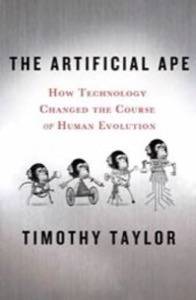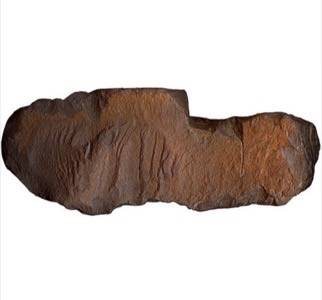In his book, “The Artificial Ape,” anthropologist and archaeologist Timothy Taylor makes the startling claim that we did not make tools, tools made us.

He reminds us that the oldest stone tools we’ve found are 2.5 million years old. But the genus to which we belong, Homo, is only 2.2 million years old, at least according to the current fossil record. Our species, Homo sapiens, has been around for less time than the gap between tool creation and our genus.
In a fascinating interview with New Scientist, Taylor believes “earlier hominids called australopithecines were responsible for the stone tools . . . The tools caused the genus Homo to emerge.”
How does that reverse the human-technology equation? Taylor believes that the creation of tools – in his example a sling to carry an infant – is “how encephalisation took place in the genus Homo.” The creation of technology to take care of infants allowed them to be born more helpless. In other words, the development of initial tech allowed evolutionary forces to shape us in a particular fashion. In fact, perhaps forced them to do so.
“We used technology to turn ourselves into kangaroos. Our children are born more and more underdeveloped because they can continue to develop outside the womb – they become an extra-uterine fetus in the sling. This means their heads can continue to grow after birth, solving the smart biped paradox. In that sense technology comes before the ascent to Homo.”
Technology allowed us to drop certain high-energy demands from our biology. Our nails didn’t need to be so much like claws, our bones didn’t need to be so thick, the muscles in our jaws got smaller, we lost our pelts. (Well, some of us did.) We had tools to do this work for us, so there was no evolutionary advantage to spending calories on them. You didn’t need to be strong to be strong.
Here’s the freaky part of his theory. If it’s true, our use of computers could shrinking our brains. That sounds like a sketch comedy proposition or grandpa carping. But his explanation is that much in the same way the ability to kill with a shaped rock made our muscles less important, the “outsourcing” of our intellects may make the energy that goes into making our brains so complex less necessary. For 30,000 years our brains have already been getting smaller. Why? The prerequisites of computer technology: language, cave painting, writing systems. Imagine what another 30,000 years could do.

In some ways, Taylor stands in opposition to Darwin. Gasp! “(W)e are not purely Darwinian entities,” he says. Instead, “entailment,” the system of creating dependent chains of tools (the right kind of rock to chip the other kind of rock to the right shape) has a different “logic” than natural selection. There is no way “to draw a definite philosophical boundary and say, here are the characteristics that are both necessary and sufficient to define (an object).” So the idea of an Internet “meme,” for instance, is artificial, not natural. There is no “survival of the fittest” with Internet ideas. There is instead context and value that are culturally-based, not structural.
Does this mean, in a sense, that we were never “natural” creatures? I think the distinction is less meaningful than it sounds, since “nature” itself is a human creation. It is the notion of a set of phenomena already divided from contiguous elements. Among them, the spirit, the intellect and of course the human.

What do you think? Are we natural or not? Do Taylor’s ideas argue for transhumanism? Or is it just another way to slice and dice the unutterable muchness of our existence? Did technology create us, and even create our ideas of death?
Stone tool photo by | Taylor photo by Karl-Ludwig PoggemanUniversity of Bradford










